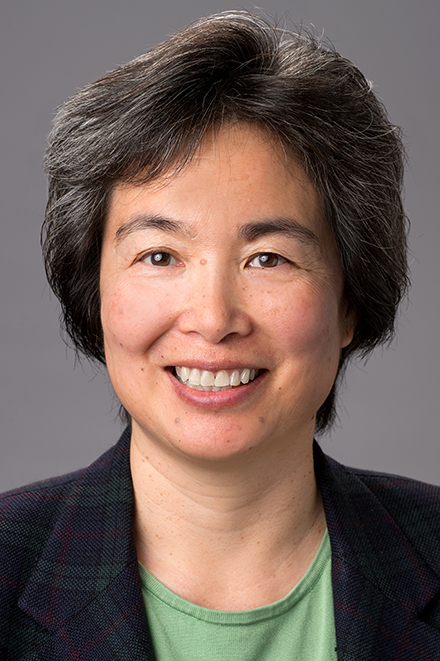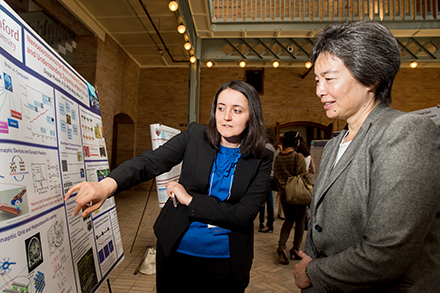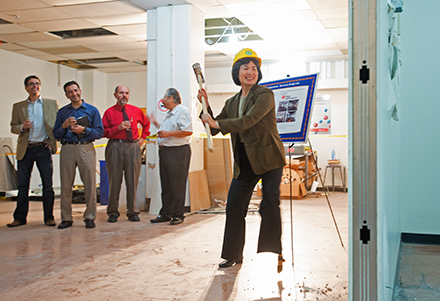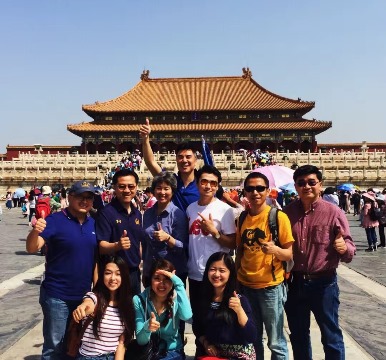Tsu-Jae King Liu named new College of Engineering dean
Tsu-Jae King Liu, vice provost for academic and space planning, professor and former chair of the Department of Electrical Engineering and Computer Sciences (EECS), has been named the next dean of UC Berkeley’s College of Engineering.
Chancellor Carol T. Christ and Executive Vice Chancellor and Provost A. Paul Alivisatos announced the appointment today (Tuesday, June 19), citing Liu’s extensive experience in academia — as an instructor, researcher and administrator — as well as in industry.
 Tsu-Jae King Liu, the 13th dean of engineering at UC Berkeley. (Click for full-size image)“In the leadership roles she has held, Tsu-Jae has demonstrated a strong commitment to excellence in teaching, to discovery and innovation, and to developing technologies that make our world a better place,” said Christ. “She does this while broadening access to the engineering disciplines for women and underrepresented minorities.”
Tsu-Jae King Liu, the 13th dean of engineering at UC Berkeley. (Click for full-size image)“In the leadership roles she has held, Tsu-Jae has demonstrated a strong commitment to excellence in teaching, to discovery and innovation, and to developing technologies that make our world a better place,” said Christ. “She does this while broadening access to the engineering disciplines for women and underrepresented minorities.”
Liu will be stepping down from her current vice provost position on June 30 to begin her position as dean of engineering the next day, July 1. The appointment makes Liu the 13th dean of the College of Engineering, as well as the first woman to hold that position at UC Berkeley. Notably, only 60 of the 368 engineering colleges and schools in the United States have female deans, according to the American Society for Engineering Education.
Liu, who holds the Taiwan Semiconductor Manufacturing Company Distinguished Professorship in Microelectronics, is succeeding S. Shankar Sastry as engineering dean. Sastry, the Roy W. Carlson Professor of Engineering and director of the Blum Center for Developing Economies, announced last October that he would be stepping down as dean after 11 years to return full time to teaching and research.
Liu will take the reins of a college that consistently ranks among the nation’s top three engineering schools and colleges, public or private. There are more than 5,600 undergraduate and graduate students enrolled in the College of Engineering.
“Berkeley Engineering has exciting opportunities to advance the frontiers of knowledge while preparing students for success in an era of increasing automation, intelligent machines and the Internet of Things, all of which are transforming the way people live, work and play,” said Liu. “UC Berkeley is distinguished by its tradition of excellence across a wide spectrum of academic endeavors. I look forward to working collaboratively with other units on campus as well as the college community to further Berkeley’s mission to serve the greater societal good.”
 Liu (right), who has won awards at Berkeley for excellence in teaching and mentoring, is also a leader of efforts to increase participation by women and underrepresented minorities in STEM fields.As dean, Liu will bolster efforts to increase diversity and to foster inclusion and respect of women and members of underrepresented minority groups in engineering. She aims to transform the culture within the college to ensure that all faculty, students and staff can thrive, with transformative impact beyond the campus.
Liu (right), who has won awards at Berkeley for excellence in teaching and mentoring, is also a leader of efforts to increase participation by women and underrepresented minorities in STEM fields.As dean, Liu will bolster efforts to increase diversity and to foster inclusion and respect of women and members of underrepresented minority groups in engineering. She aims to transform the culture within the college to ensure that all faculty, students and staff can thrive, with transformative impact beyond the campus.
“Although people from every segment of society can contribute to and benefit from endeavors in engineering, today the diversity of students who study engineering is not representative of society,” said Liu. “Creating a more inclusive environment that welcomes and supports the success of all students is critical to maximizing the impact of our educational and research programs.”
The dean appointment marks the latest step in an impressive career trajectory for Liu, 55, who is known for her innovations in semiconductor devices and technology. She was born in Ithaca, New York, while her parents, who immigrated to the United States from Taiwan, were graduate students at Cornell University.
“My father’s research was in earthquake prediction, so he moved the family to California where the action was — and still is,” said Liu, who spent the majority of her childhood in the San Francisco Bay Area.
Liu earned her B.S., M.S. and Ph.D. degrees in electrical engineering at Stanford University in 1984, 1986 and 1994, respectively. Before completing her doctorate, she joined the research staff at the Xerox Palo Alto Research Center (PARC), where she worked on polycrystalline-silicon thin-film transistors, technology that is still used today in high-definition flat-panel displays and for imaging applications.
In 1996, Liu left Xerox PARC to join UC Berkeley as a faculty member in the EECS department. Over the past decade, Liu has gained considerable experience in campus administration. Before her current vice provost position on campus, she served as associate dean for research and associate dean for academic planning and development at the College of Engineering. Prior to serving as chair of the EECS department, she was the vice chair for graduate matters. She was also faculty director of the UC Berkeley Microfabrication Laboratory for six years and oversaw its transition into the Marvell Nanofabrication Laboratory, for which she served as faculty director in 2012.
As a researcher, Liu has been productive; she has authored or co-authored more than 500 publications and holds 95 patents in the field of integrated-circuit devices and technologies.
 Liu lends a hand — and a sledgehammer — at the groundbreaking for the Texas Instruments Electronic Design Lab, one of numerous industry partnerships that prospered during her tenure as EECS dean. (Photo by Matt Beardsley)Among the most notable research achievements in Liu’s portfolio is her collaboration with fellow Berkeley engineering professors Chenming Hu and Jeffrey Bokor to develop an advanced fin-shaped field-effect transistor design, dubbed “FinFET,” that can be scaled down in physical dimensions to below 25 nanometers. Today, FinFETs are used in all leading-edge microprocessor chips, which comprise over 10 billion transistors per square centimeter.
Liu lends a hand — and a sledgehammer — at the groundbreaking for the Texas Instruments Electronic Design Lab, one of numerous industry partnerships that prospered during her tenure as EECS dean. (Photo by Matt Beardsley)Among the most notable research achievements in Liu’s portfolio is her collaboration with fellow Berkeley engineering professors Chenming Hu and Jeffrey Bokor to develop an advanced fin-shaped field-effect transistor design, dubbed “FinFET,” that can be scaled down in physical dimensions to below 25 nanometers. Today, FinFETs are used in all leading-edge microprocessor chips, which comprise over 10 billion transistors per square centimeter.
Liu is a fellow of the Institute of Electrical and Electronics Engineers (IEEE), an elected member of the National Academy of Engineering and a fellow of the National Academy of Inventors. She has garnered numerous awards for her research, including the DARPA Significant Technical Achievement Award for the development of FinFET; the IEEE Kiyo Tomiyasu Award for contributions to nanoscale MOS transistors, memory devices and MEMs devices; and the Semiconductor Industry Association Outstanding Research Award.
She also has received recognition for excellence in teaching and mentoring, including the EE Division Outstanding Teaching Award, UC Berkeley Distinguished Faculty Mentoring Award and the Semiconductor Research Corporation Aristotle Award.
Her research presently focuses on nanometer-scale logic and memory devices, and advanced materials, process technology and devices for energy-efficient electronics.
Liu’s industrial experience comes not only from her time at Xerox PARC, but through a technology start-up she co-founded called Progressant Technologies, which was acquired by Synopsys, Inc., where she served as senior director of engineering in the Advanced Technology Group.
Liu noted that her ties to Berkeley go beyond her career here. She has close family members who are part of the UC Berkeley family, including her husband, David Kuan-Yu Liu, who earned his bachelor’s degree with a Certificate of Distinction in electrical engineering and computer sciences at the College of Engineering.













